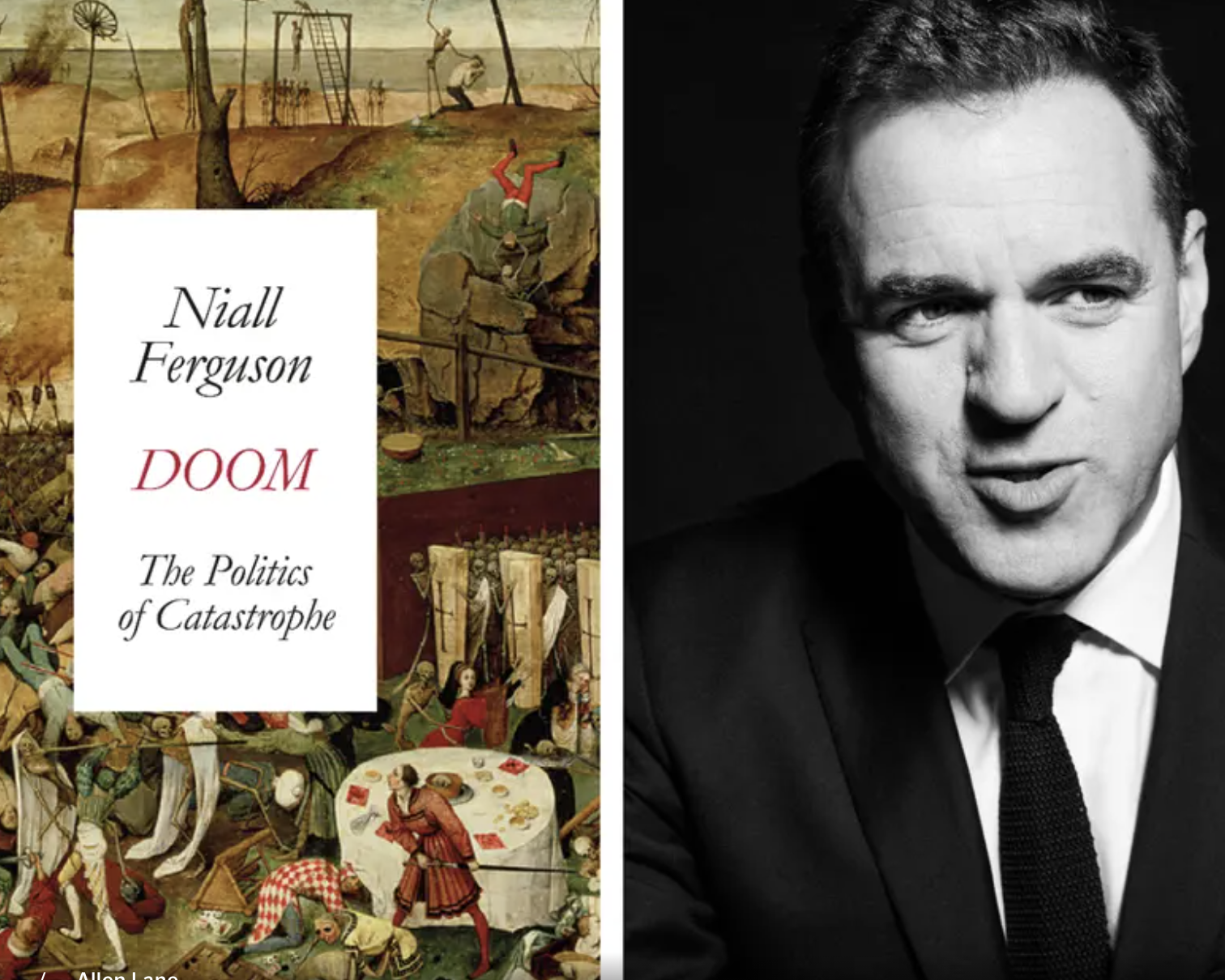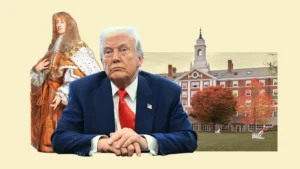
Doom: The Politics of Catastrophe by Niall Ferguson review
(Evening Standard) – From plagues and volcanic eruptions to the current Covid pandemic, mankind has always been faced with catastrophes.
Thought Leader: Niall Ferguson

When a head of state picks a fight with a university, you generally expect the university to lose. Even the richest university — say, Harvard — does not have pockets as deep as the government. And as for armed force, to paraphrase Stalin, “How many divisions does the president of Harvard have?”
And yet the pen is sometimes mightier than the sword, the gown more powerful than the crown. King James II learnt this the hard way in 1687 when he attempted to impose a new president on the fellows of Magdalen College, Oxford. The college still celebrates its victory over the last Stuart monarch each year at its Restoration dinner.
James had thought he could insert a Roman Catholic as president. The fellows refused, instead electing one of their own number, John Hough. The king would not stand for it, though he picked a less controversial candidate for president: Samuel Parker, the Bishop of Oxford. He even went to Oxford in person and harangued the fellows, as Macaulay recounts in his History of England. “You have not dealt with me like gentlemen,” exclaimed the King. “You have been unmannerly as well as undutiful … Go home. Get you gone. I am King. I will be obeyed. Go to your chapel this instant; and admit the Bishop of Oxford. Let those who refuse look to it. They shall feel the whole weight of my hand. They shall know what it is to incur the displeasure of their Sovereign.”
On October 20, three royal commissioners (with three troops of horse) arrived at Magdalen. Bishop Parker was forcibly installed. On November 15, twenty-five fellows were expelled and declared incapable of receiving any future ecclesiastical employment. And yet the king had overreached, as Macaulay relates: “Every successive blow … which fell on Magdalen College, was felt to the extremities of the kingdom. In the coffeehouses of London, in the Inns of Court, in the closes of all the Cathedral towns, in parsonages and manor houses scattered over the remotest shires, pity for the sufferers and indignation against the government went on growing.”
Hough was restored to the presidency on October 25, 1688, and the fellows to their seats at high table. Just 11 days later, at the invitation of a group of Protestant aristocrats, James’s son-in-law William of Orange landed at Brixham. On December 23, James fled to France.
Of course, James’s quarrel with the fellows of Magdalen was only one of the many causes of the Glorious Revolution. It was just a symptom of his broader ambition to undo the English Reformation. Still, the story is a reminder that even the most powerful ruler should think twice before attacking academia.

I was reminded of this historical episode on April 3, when Harvard received a letter from three officials in Donald Trump’s administration, who accused the university of having “fundamentally failed to protect American students and faculty from antisemitic violence and harassment in addition to other alleged violations of Title VI and Title VII of the Civil Rights Act of 1964”.
Eight days later, Harvard received another letter from the government. This one demanded that the university take a long list of actions if it wished to continue receiving federal funds. For example, Harvard must: hire a third party to audit certain programmes, identify faculty members who contributed to antisemitism on campus, and sanction them “within the bounds of academic freedom and the First Amendment”; implement merit-based hiring and admissions reforms, to be audited by a third party; and shut down all diversity, equity and inclusion (DEI) programmes and offices. Not long after, the government suspended $2.2 billion in multiyear federal grants and $60 million in contracts.
Nor was that all. Last week Donald Trump published one of his regular “truths”. “We are going to be taking away Harvard’s Tax Exempt Status,” he wrote on his own social media platform. “It’s what they deserve!” Like most US universities, Harvard has tax-exempt status as an educational institution, which means it does not pay income taxes on net earnings and its donors get income-tax deductions.
The latest Harvard-bashing missive came on Monday, when Linda McMahon, the education secretary, informed the Harvard president Alan Garber that he “should no longer seek GRANTS from the federal government, since none will be provided” as the university had engaged “in a systemic pattern of violating federal law”. Harvard had enough money of its own, she argued. “Thank you for your attention to this matter!” she concluded — a favourite Trump sign-off. In other words: “They shall know what it is to incur the displeasure of their sovereign.”
Now, Harvard’s endowment is indeed enormous, around $50 billion, the kind of money UK universities can only dream about. But, as Jim Hankins explained in the Wall Street Journal, most of it is tied up in donor-restricted funds, and, in any case, it covers only 37 per cent of Harvard’s annual operating costs of $6.5 billion. For the rest, the university relies on tuition (20 per cent), federal grants (11 per cent), current gifts from alumni and other donors, and borrowing. So the Trump administration’s actions are not trivial threats to its financial stability.

Like the fellows of Magdalen in 1687, Harvard has resisted the government’s encroachment on its traditional privileges. On April 21, the university filed a lawsuit against the Trump administration. The suit argues that the government has “violated its constitutional rights” and “imperiled its academic independence”. Garber has said that the threat to revoke the school’s tax-exempt status is “highly illegal” and “destructive to Harvard”.
The question therefore arises: Do all right-thinking people now have to defend Harvard against the American equivalent of James II, in the same way the wider English public rallied behind the fellows of Magdalen? My old friend Greg Lukianoff of the Foundation for Individual Rights and Expression (Fire) says we do, “on principle”, because the government is exceeding its lawful powers in ways that “would catastrophically undermine academic freedom, free speech, and institutional independence on campus”.
Moreover, to quote Atul Gawande, a Harvard professor of surgery, “more than 90 per cent of the nine billion federal dollars for Harvard that are now in danger supports life sciences … Three quarters of it goes to five independent Boston hospitals affiliated with its medical school”, one of which is Brigham and Women’s.
Having served as a Harvard professor for 12 years, and as the father of a child who was born — by emergency C-section — at Brigham and Women’s, I would surely be a hypocrite if I shrugged my shoulders and said: “Harvard had it coming.” And yet, I believe we all must think twice before we uncritically toe the line that Trump is the villain, like James II, and the professors of Harvard the heroes, like the fellows of Magdalen.
Late last month, the Harvard Presidential Task Force on Combating Antisemitism and Anti-Israeli Bias published its report. It depicts a shocking culture of intolerance on campus: “Student activists [attempt] to drive Israeli students (and Jewish students who feel connected to Israel) out of student life.
This often takes the form of ‘shunning’.” And: “American Jewish students told us … they felt pressure to condemn Israel to prove they were ‘one of the good ones’ (meaning, an ‘anti-Zionist Jew’), and faced social consequences when they refused.” Moreover: “Jewish students told us stories of Harvard-run ‘privilege trainings’ where they were told that they were deemed to be privileged not only by dint of being identified as White but also because of their Jewishness”.
One example detailed a required session for all graduate students, which included a graphic about white supremacy. “The graphic labels opposition to the Boycott, Divestment, Sanctions (BDS) movement as considered ‘coded genocide’, placing it alongside the Anti-Defamation League (ADL). Both are positioned merely one step removed from ‘overt genocide’, which includes examples like lynching and the KKK … The instructor displayed the graphic on screen for an extended period without addressing its problematic characterisation of Jewish organisations and perspectives.”
“Problematic” is a very Harvard word. The problem here is that an institution once notable for its high proportions of Jewish faculty and students has, by its own admission, become a hotbed of antisemitism, even if some of this can be construed as anti-Israelism, a somewhat different thing. According to research by Fire, 67 per cent of Harvard students say it would be difficult to have an open and honest conversation about the Israeli/Palestinian conflict. Among faculty, the share is 84 per cent.

And this is not Harvard’s only problem. It has an anti-conservatism problem too. According to the student newspaper Harvard Crimson’s 2023 survey, only 2.5 per cent of faculty respondents identified as conservatives, with more than three quarters identifying as liberal. More than 90 per cent of political donations from Harvard employees go to the Democratic Party, Lukianoff notes.
According to the Harvard Crimson, more than half of the class of 2027 — 65 per cent — identified as progressive, while only 8.4 per cent identified as conservative. Not surprisingly, “While 41 per cent of liberal students reported feeling comfortable discussing controversial topics, only 25 per cent of moderates and 17 per cent of conservatives felt similarly.”
And let’s not forget Harvard’s systematic anti-Asianism in its admissions policy, first exposed by Ron Unz and culminating in the 2023 Students for Fair Administrations case, which led the Supreme Court to rule that affirmative action programmes were unconstitutional. Has that led to reform? Don’t ask me; ask the liberal commentator Matthew Yglesias, who wrote recently that “Harvard and most other elite schools do not appear, in practice, to have dramatically altered their admissions practices”. That should not surprise us.
In short, there is a prima facie case that Harvard has in multiple ways violated civil rights law in ways that would justify the loss of its tax-exempt status. That is the standard the Supreme Court set in 1982, when it upheld a decision by the US taxman to revoke the tax-exempt status of Bob Jones University, in Greenhill, South Carolina, over its racially discriminatory policies, which included rules against interracial dating. (BJU regained its tax-exempt status in 2017, having abandoned the interracial dating rule in 2000.)
I see no meaningful difference between that kind of discrimination and the discrimination that has been going on at Harvard. Discrimination is discrimination, whether you are inspired by the KKK or by DEI. When departments are told, “You cannot hire a white man for this position,” that’s illegal. And we know such things have happened at Harvard.

You may be surprised that I, as someone who still holds a fellowship at Harvard’s Belfer Center, would say that. It’s certainly very un-Harvard-like behaviour, in the sense that I am exercising my right of free speech. Here’s the Harvard Crimson again, from February 10.
“Only one third of Harvard’s last graduating class felt comfortable expressing their opinions about controversial topics during their time at the College, the University’s 2024 senior survey found, reporting a 13 per cent decrease from the Class of 2023.” Guess what? Only 19.2 per cent of the Class of 2028 are very concerned or concerned about free speech.
Harvard students are pretty woke, it’s clear. But they are not complete outliers. On the contrary, as nationwide surveys by Heterodox Academy and Fire show, they are pretty representative. Take the issue of Israel and the Palestinians. According to Pew, a third of Americans under 30 say their sympathies lie either entirely or mostly with the Palestinian people, while 14 per cent say the same about the Israeli people.
For adults as a whole, the shares are 16 per cent (pro-Palestinian) and 31 per cent (pro-Israeli); for over-64s, 9 per cent and 47 per cent. Americans aged 18-29 have the lowest approval of Trump of any generation — 34 per cent approval, 66 per cent disapproval — compared with 47 per cent to 55 per cent for all ages. They’re also least proud to be American: 46 per cent, compared with 62 per cent for all ages, according to an NBC poll last month.
As has long been obvious, there is a fairly seamless continuum that leads from illiberalism to outright authoritarianism. We should therefore not be surprised that Generation Z is also turning away from democracy. According to a new More in Common survey, nearly half of Gen Z Americans (47 per cent) agree that “sometimes it’s OK for leaders to set aside democratic principles (eg constitutional checks and balances) to fix the economy” compared to 29 per cent of all Americans. A quarter of Gen Z (25 per cent) say they “don’t really care” about the constitution. And only four in ten Gen Z-ers (42 per cent) say democracy is “definitely the best” form of government for America.
All this is what the higher education establishment has wrought, no doubt with some help from social media apps and smartphones. Harvard merely exemplifies the rot that permeates the entire system. And yet my great fear is that, as happened in the case of James II and the fellows of Magdalen, too aggressive an external challenge may end up backfiring. For the reality is that the Trump administration chose the bazooka, not the scalpel, when it decided to make an example of Harvard. My nightmare is that, as a result, the worst culprits in the downfall of Harvard will now re-emerge from their recent, conspicuous silence to pose as the heroic upholders of academic freedom.
I sincerely wish Harvard could heal itself. I wish the entire governing corporation of the university had resigned after the fiasco of Claudine Gay’s DEI presidency. And I wish Garber had the power to undo all the damage his predecessor did. But I know the place too well. Without significant external pressure, it is as likely to give up the excesses of DEI as BJU was likely to give up segregation. But the pressure needs to be applied with precision. In his war on Oxford, James II overplayed his hand. I fear Donald Trump may have made the same mistake in his war on Harvard.
This article is from WWSG exclusive thought leader, Niall Ferguson. In his insightful discussions, he explores key geopolitical shifts. With a deep understanding of economic and security dynamics, Ferguson brings a historical perspective to today’s most pressing global challenges. To invite Sir Niall Ferguson to your next event, contact WWSG.
Doom: The Politics of Catastrophe by Niall Ferguson review
(Evening Standard) – From plagues and volcanic eruptions to the current Covid pandemic, mankind has always been faced with catastrophes.
Thought Leader: Niall Ferguson
Time to end secret data laboratories—starting with the CDC
The American people are waking up to the fact that too many public health leaders have not always been straight with them. Despite housing treasure…
Thought Leader: Marty Makary
David Frum: How Harris Roped a Dope
This piece is by WWSG exclusive thought leader, David Frum. Vice President Kamala Harris walked onto the ABC News debate stage with a mission: trigger…
Thought Leader: David Frum

